Reflections
SXSW Film Festival and Conference
Fri., March 14, 1997
BEN JOHNSON: THIRD COWBOY ON THE RIGHT
Dir/Prod: Tom Thurman; Exec Prod: Latelle LaFollette, Chris Iovenko, Arthur Rouse; Scr: Tom Thurman, Tom Marksbury; Ed: Gary Grider; with James Coburn, Charlton Heston, Harry Dean Stanton, John Milius, Peter Bogdanovich, Polly Platt, Harry Carey, Jr., Ben Johnson.
16mm, 82 min., 1996 (RP)
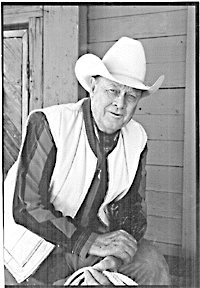
Ben Johnson: Third Cowboy on the Right |
THE BIBLE AND GUN CLUB
Dir/Prod/Scr: Daniel J Harris; Exec Prod: Ariel Perets, Pierre Sevigny; DP: Alex Vendler; Ed: Christopher Hink; with Andy Kallok, Don Yanan, Al Schuermann, Julian Ott, Robert Blumenthal.
35mm, 87 min., 1996 (RP)
They're pounding the pavement, they're knocking on doors, they're the traveling salesmen of the Nineties, but these days they're not peddling Encyclopedia Britannicas, they're selling Bibles. And guns. They're the men of the American Bible and Gun Club, a none-too-elite cadre of over-the-hill schmoes in search of a quick buck in Daniel J. Harris' audacious, hilarious new film. The Anaheim chapter of the AB&GC -- which includes their boss Bill (Al Schuermann), Bill's son-in-law Mike (Julian Ott), hypochondriac Stan (Andy Kallok), former rabbi and resident Bible expert Sidney (Robert Blumenthal), and new recruit Phil (Don Yanan) fresh from a lengthy stint with the LAPD -- heads off to gorgeous Las Vegas for the club's annual convention. Once there, the group runs into trouble in the form of a rival AB&GC chapter (from Texas, no less) out for territorial blood, strait-laced Phil gets a shot at porno film stardom, and everyone pursues the elusive Neil Diamond tickets. It's Glengarry Glen Ross, with fewer expletives and more heart. Harris' affectionate, hilarious take on the club is one long traveling salesman joke, but without the farmer's daughter. Shot in crisp black and white, the film has a palpable retro feel that's at once kitschy yet cool. Although clearly set in present-day Vegas, these righteous, pistol-packing, scripture merchants might as well have come out of Cali circa 1963. Fuse Harris' wry sense of deadpan humor with an amazing soundtrack featuring Esquivel, Herb Alpert, Neil Diamond, and even Don Walser, and you've got one of the most offbeat, original films of the year. -- Marc Savlov
THE BROKEN GIANT
Dir/Scr: Estep Nagy; Prod: Jeffrey Clifford, Jonathan Cohen; DP: Garrett Fisher; Ed: David Leonard; with John Glover, Brooke Smith, George Dickerson, Missy Yager, Will Arnett, Chris Noth.
35mm, 83 min., 1996 (RP)
This tale of a rural New England minister who, with disastrous results, offers sanctuary to a young girl on the run is a quietly compelling tour de force, full of unspoken terrors and the constant threat of emotional upheaval. Arnet plays Ezra, the town preacher, who opens his church doors one day to find a disheveled, unshod young girl by the name of Cleo (Yager). At first hesitant to speak of her plight, her flight, and pretty much everything else, she instead accepts Ezra's offer of shelter and safe haven, resting quietly in the church's adjoining living area. Ezra, meanwhile, continues typing (and deliberately setting fire to) notes to his long-dead grandfather on a battered old Underwood. His girlfriend Rosemary (Smith) sees what is happening, even when Ezra cannot, and when Cleo's abusive father (Glover) comes in search of her, it's only a matter of degrees before an ancient tragedy visits Ezra once again. Nagy has crafted a powerful, understated meditation on the nature of faith, love, and the lengths to which one will go to assist others, even as the threat of self-destruction looms. Cleo's arrival in a fiery crimson dress heralds the arrival of more than just trouble in the young preacher's life, which is suddenly, permanently disrupted by this runaway girl. Nagy's film is gorgeous to behold, rife with breathtaking cinematography and the sort of spare, poetic dialogue that is so uncommon these days. The Broken Giant is an emotional triumph that builds inexorably to a painful, disturbing conclusion. The short film "Breezeway" by George Langworthy screens before The Broken Giant. Its story about a deadline-beset architect (Joe Stevens) in the throes of a quitter's nicotine fit provides a good complement to the feature's climactically explosive slow burn. In turns humorous and harrowing, the well-executed "Breezeway" (which was filmed in Austin's Hyde Park and features Don Walser) is the kind of self-contained work that gives short films a good name. -- Marc Savlov
CAN'T YOU HEAR THE WIND HOWL? THE LIFE & MUSIC OF ROBERT JOHNSON
Dir: Peter Meyer; Prod: Peter Meyer, Constance Meyer; Exec Prod: Thom Havens, Philipp Nick; Scr: Jean Compton, Peter Meyer; DP: Philip C. Pfeiffer, Ken Mandel; Music: Robert Johnson, Keb' Mo'; with Danny Glover, Kevin Moore, Johnny Shines, Robert Cray, Honeyboy Edwards, Robert Jr. Lockwood, Yolonda Williams.
16mm, 77 min., 1996 (WP)
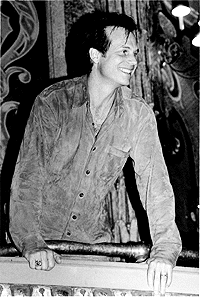
Bill Paxton surveys the crowd from the opera box at the Paramount Theatre before the world premiere of Traveller |
DRIVEN
Dir/Scr: Michael Paradies Shoob; Prod: Daniel Linck; DP: Joseph Mealey; Ed: Fabienne Rawley; with Tony Todd, Whip Hubley, Daniel Roebuck, Chad Lowe, Diane Dilascio, Xander Berkeley, Lou Rawls.
35mm, 95 min., 1996 (RP)
Ever wonder what Travis Bickle's pal Wizard and his cabbie buddies did when hair-trigger Travis was off being "God's lonely man?" Chances are they did just what the characters in Driven do: drive cabs. There's much more to it than that, though. Darius Pelton (Todd) is waiting for that one big score while dreaming of the wife and child he left behind. Schneider the bookie (Roebuck) is dreaming of getting his own sports betting show. And the idealistic Schuyler (Hubley) is simply dreaming of a better life. Alongside their coworkers and dispatcher, these are the men of the Red Star Cab Company, a down-on-its-luck Los Angeles group that sees and seizes an opportunity for all involved when their chief competitors -- the hated Yellow Cab Company -- goes under. Suddenly the money is flowing like water, and dreams are starting to come true. The brilliance of Shoob's film, apart from its powerful characterizations, is the subtlety and nuance apparent in nearly every frame. Unlike most cinematic depictions of cab drivers, these guys are the real thing, dealing with good days and bad, tragedies, emotional baggage, and the day-to-day grind to which most of us give barely a passing thought. Poignant, lyrical, humorous, and altogether honest, Driven conjures up images of early John Sayles and even Cassavetes. It's a powerhouse ensemble piece that sizzles with electrifying intensity and heart. -- Marc Savlov
FAMILY NAME
Dir: Macky Alston; Prod: Selina Lewis; Exec Prod: Nicholas Gottlieb; DP: Eliot Rockett; Ed: Sandra Marie Christie, Christopher White.
16mm, 89 min., 1997 (RP)
As a child growing up in Durham, North Carolina, Macky Alston never questioned why all the many other Alstons residing in the area were black-skinned and his own family was white. Years later, as a grown-up documentary filmmaker, Macky Alston becomes intrigued by the question and takes us on this Roots-style journey into his family history. The reason, of course, for the racial divide goes back to slavery and the custom of slaves being given the surnames of their plantation owners. Thus, Alston is thrust headlong into his slave-owning ancestry, a legacy he probes with his movie camera. Returning to North Carolina, Macky Alston discovers that two separate Alston family reunions -- one black and one white -- are occurring almost simultaneously just miles apart. As the filmmaker peels the bark off this quintessentially American family tree, we keep being surprised by what he discovers. Instead of the anticipated emotions of lingering black resentment and buried white guilt, Alston finds people's feelings to be much deeper and more assimilative. Like him, the Alstons he discovers and interviews, both black and white, want to understand the past and find its usefulness in the present. Along the way, Alston meets and interviews some very interesting people. Family Name shared the Freedom of Expression award at this year's Sundance Film Festival, an appropriate honor for this resonant saga. -- Marjorie Baumgarten
FULL TILT BOOGIE
Dir: Sarah Kelly; Prod: Rana Joy Glickman; Exec Prod: Quentin Tarantino; DP: Chris Gallo; Ed: Lauren Zuckerman; with Quentin Tarantino, Robert Rodriguez, George Clooney, Juliette Lewis, Elizabeth Avellan, Lawrence Bender, Douglas Aarniokoski, Victoria Lucai.
35mm, 97 min., 1997 (WP)
Heart of Darkness meets Night of the Living Dead in a south-of-the-border titty bar. Kelly's documentary on the making of Robert Rodriguez's two-pronged vampire epic From Dusk Till Dawn is a gritty little gem, easily the most entertaining and insightful (not to mention humorous) look at what actually goes on behind the scenes on a film set. And this isn't just any film set, either: With Austin auteur Rodriguez at the helm, and the wisecracking duo of Tarantino and Clooney bringing up the rear, Full Tilt Boogie plays like 81/2 on laughing gas, but without all those somber Italians. Extended interviews with everyone from the grips to the set designers to Q.T.'s wry personal assistant, Victoria Lucai, make this not only a documentary about the myriad travails of the shoot, but also a celebration of the collaborative filmmaking process in general. Sandstorms, union disputes, and logistical nightmares are all on display, but the heart and soul of Kelly's film is best exemplified by the guerrilla spirit of the production: Under Rodriguez's watchful eye ("He's a god," quips Lucai), cast and crew work like a well-oiled machine, accomplishing the seemingly impossible, and grinning all the while. -- Marc Savlov
GEORGE B.
Dir/Scr: Eric Lea; Prod: Wade W. Danielson, Gloria Pryor; Exec Prod: Mark Terry; DP: Wayne Kennan; Ed: Pamela Raymer; with David Morse, Nina Siemaszko, Brad Gregg, John Franklin, Grace Zabriskie, Henry V. Brown, Jr.
35mm, 100 min., 1996 (RP)
George B. marks the sweetly promising debut of writer-director Eric Lea. Assembling a terrific cast expertly led by character actor David Morse as the affable George, Lea proves that he has a talent for developing full and rich characters. George is a small-town janitor for whom life is one big promise. When we first meet George, his naïveté and dogged zest for life have landed him in what surely must be only one of many situations in which he does not have the upper hand. Enter Angela (Siemaszko), a very pretty and calculating young woman with whom George quickly falls in love. After a whirlwind trip to Reno to celebrate his birthday and replenish his wallet, George and Angela set up house. Just as George finally is beginning to see his enormous faith in life rewarded, he finds himself in over his head. Part of the pleasure of this film lies in the measured pacing of George's story. With no one to look out for him but himself, we become George's guardians. But ultimately this may be unnecessary, for as George always says, "From now on, things are only gonna get better." For first-time director Lea, the same most likely will hold true.
-- Alison Macor
GROSSE POINTE BLANK
Dir: George Armitage; Prod: Susan Arnold, Donna Arkoff Roth, Roger Birnbaum; Exec Prod: Jonathan Glickman, Lata Ryan; Story: Tom Jankiewicz; Scr: Tom Jankiewicz, D.V. DeVincentis, Steve Pink, John Cusack; with John Cusack, Minnie Driver, Alan Arkin, Dan Aykroyd, Joan Cusack.
35mm, ??min., 1997 (RP)
Meet Martin Blank (Cusack). He's a professional killer, and he's going home to Grosse Pointe, Michigan to "delete" someone. Unfortunately, home takes on new meaning for Martin when he discovers that the family homestead has been converted to an UltiMart Convenience Store. ("You can never go home again, but you can shop there.") His assistant (played by sister Joan Cusack) encourages him to attend his 10-year high school reunion while he's there because, "It segues so nicely into the rest of the weekend." When Martin arrives back in Grosse Pointe, however, his carefully calibrated professional killing world begins to fall apart as he rekindles his love affair with high school girlfriend Debbie (Minnie Driver). Directed by George Armitage (Miami Blues) and co-written by Cusack, Grosse Pointe Blank is a little wacky and a lot of fun. Cusack and Driver strike up considerable chemistry, and, as usual, Cusack's comic timing is on the money. Supporting roles by Alan Arkin as the therapist who's terrified to have a hit man as a client and by Dan Aykroyd as one of Martin's competitors (along with a number of smaller, well-played roles) add to the creative mix. Thanks to a late-Eighties soundtrack and numerous high school stereotypes, Grosse Pointe Blank captures that elusive "special torture" that was life before graduation. Why go to your own reunion when you can watch Martin suffer through his? -- Alison Macor
LETTER FROM WACO
Dir: Don Howard; Prod: Terri Clemens.
Video, 56 min., 1996 (WP)
Waco-bred documentarian Howard is one of those lucky people born with extra-sensitive receptors for the magic pulsing beneath life's mundane surfaces. His hometown, though widely regarded as the very epitome of mundanity, emerges as a place of mystery, enchantment, and even soul (in the secular sense) in this charming and technically innovative tribute. Though Howard credits Letter From Siberia by French filmmaker Chris Marker as inspiration, viewers may detect more attitudinal similarity to the bravura storytelling of Spalding Gray. Howard displays a similar blend of wistfulness, irreverence, and skill at enhancing the fundamental truth of his narrative through judicious use of semi-fictionalized material. The former Waco high school quarterback clearly has no desire to ridicule the quirky cast of local "characters" he depicts in his blend of actual documentary footage and staged scenes. The dominant impression is that of a man earnestly striving to explain for others something that he himself doesn't fully understand. The Wacoans' stories, like Howard's whimsical side trips into local social mores, weather, sports lore, and scandals, are all part of a fascinating puzzle that the artist invites us to join him in solving. -- Russell Smith
MARY JANE'S NOT A VIRGIN ANYMORE
Dir/Scr/DP: Sarah Jacobson; Prod: Sunny Andersen, Ruth Ellen Jacobson; with Lisa Gerstein, Greg Cruikshank, Beth Ramona Allen, Andrew David DeAngelo, Chris Enright, Marny Snyder, Brandon Stepp.
16mm, 98 min., 1996 (RP)
"What's the story with Jane?" everyone keeps asking each other at the small movie house where Mary Jane (Gerstein), a smart and rebellious high school senior, works after school. This is the kind of job where lifetime friendships are formed and there is no such thing as a well-kept secret. The story with Jane is the story of finding female sexual satisfaction in a basically unsatisfying world. Jane's unceremonious deflowering jump-starts the film, and despite a few too many experiences being crammed into its narrative, Mary Jane takes a refreshingly candid look at female sexuality and the never-ending battle between the sexes -- a phrase whose boundaries most certainly need to be redrawn. An on-target performance by Gerstein adds to the film's authenticity, as do the supporting roles by Allen and Cruikshank as friends Ericka and David. Although a mystified Jane can be heard muttering, "I just feel like I'll never get it" with respect to male/female dynamics, Jacobson's film assures us that at least one person already does. -- Alison Macor
THE MUSIC DISTRICT
Dir/Prod: Susan Levitas; with the Orioles, Junkyard Band, Four Echoes, Kings of Harmony.
Video, 56 min., 1996 (RP)
This informative, variegated glimpse into Washington, DC's music district addresses four distinct stylings of African-American music indigenous to the DC area. You won't find any hip-hop or jazz in this engaging documentary, though -- this is strictly a harmony- and choir-based affair. The Orioles, the long-running (since the early 1950s) R&B quartet, are featured, along with the funkified go-go beats of the Junkyard Band, the jubilee perfection of the Four Echoes, and the brass call-and-response "shout band" music of the Kings of Harmony. Taken together, it's a wonderfully soulful look at several types of music not much seen outside Washington's black churches and nightspots. None of these styles is very likely to storm the charts anytime soon, which is a shame: One listen to the liquid-gold, four-part gospel of the Four Echoes and you may find yourself transported to, well, if not heaven, then somewhere definitely in the neighborhood. Susan Levitas combines live footage of all the groups involved in the production, as well as detailed and telling interviews with the principals. Most entertaining are the members of the Junkyard Band, whose ska/funk/call-and-response take on DC's world-famous go-go scene is infectious in the extreme. The Music District may make you wish for a theatre without seats; after all, you're going to want a clear dance floor to move on.
-- Marc Savlov
PIN GODS
Dir: Larry Locke; Prod: Jan Grznar; Exec Prod: Jan Grznar, Larry Locke; DP: Scott Pauly; Ed: Ann Moore.
16mm, 82 min., 1996 (RP)
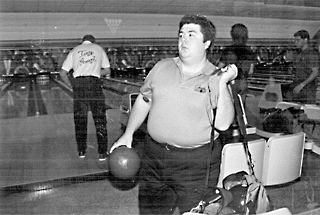
Pin Gods |
PURGATORY COUNTY
Dir/Scr: George Ratliff; Prod: Mark Miks; Exec Prod: Keevin Clark, Jeffery Keith; DP: Phil Curry; Ed: George Ratliff, Craiger Couger; with Trent Turner, Terry Rogan, Patt Vee, Sallie Guy, Don Cass.
35mm, 100 min., 1997 (WP)
From the director of the acclaimed documentary The Plutonium Circus comes this twisted tale of small-town Texas life on its way from bad to worse to downright deadly. It's cowboy-noir filtered through Ratliff's decidedly unique sensibilities. Trent Turner plays Duane, the newly elected sheriff of Purgatory County, a 10-watt bulb in a county of 25-watt scoundrels. Splitting his time between caring for his cantankerous, bedridden Mama (Patt Vee) and idly sucking up to Purgatory's own version of Boss Hogg, the unctuous schemer Lucky (Don Cass), Duane finds himself duped into committing Oedipal manslaughter. As if that weren't enough, he's also sleeping with his estranged brother's wife, Liz (Sallie Guy). When the sociopathic sibling-husband Perkins (Terry Rogan) shows back up at the homestead, sparks -- and bullets -- fly in a seriocomic free-for-all that leaves your head spinning and your gut knotted. Ratliff and cinematographer Phil Curry (Richard Linklater's subUrbia) have fashioned a visual feast for the eyes and ears, replete with dilapidated Southern mansions, double-crossing women, and grimly comic malaise. Fans of the Coen brothers will find the film's characters every bit as oddball as those populating last year's Fargo, albeit slightly less endearing. There's no easy way out for any of these small-town losers, but I suspect the director wouldn't have it any other way. A Texas tall tale for the Nineties: bullets, brothers, and bloodshed. -- Marc Savlov
REAL STORIES OF THE DONUT MEN
Dir/Scr: Beeaje Quick; Prod: Elizabeth Avellán, Pamela Cederquist, Rana Joy Glickman; Exec Prod: Melissa Carrey; DP: Sead Muhtarevic; Ed: Dan Fort, Ethan Maniquis, Michael Brandt; with Ignacio Alvarez, Beeaje Quick, Randy Gatica, Eddie Daniels, Melissa Carrey, Christina Fulton, Peachy Keene, Corbin Timbrook.
16mm, 87 min., 1997 (WP)
Two punks and one pissed-off hacker-cum-filmmaker take the law into their own hands and bring The Man to his knees. Anarchy, pure and simple! Quick's feature debut is a hilarious, gonzo rocket ride straight into the greasy maw of urban bureaucracy, shot through with surreal, Three Stooges-like slapstick and a knowing sense of the absurdities of everyday life in the big city. When Juan Palotes (played by writer-director Beeaje Quick) has the worst day of his life (his car is towed, he's steamrolled by the cops, and the mayor's office dismisses him out of hand), he decides to get even by hiring a pair of deranged punk rockers and turning them into full-fledged cops via his hacking skills. Newly minted officers God and Homes (Ignacio Alvarez and Randy Gatica) tool around the city, ripping off liquor stores and nailing adolescent cheerleaders, while Juan films their viciously cool tour of revenge. Quick's comic flair and cinematic sensibilities are astonishingly on-target; Real Stories of the Donut Men grabs you by the cajones and then yanks, spanks, and cranks it all up to 11. "Never mind your rights," indeed. -- Marc Savlov
REDBOY 13
Dir/Scr: Marcus van Bavel; Prod: Marcus van Bavel, David Boone; Exec Prod: Louis Saldana, Drew Dennett; DP: Brian O'Kelley; with Robert Logan, Devon Roy-Brown, Charlie Schmidt, Wendy Blech, Tito Villalobos Moreno, David Boone, Marcus van Bavel.
35mm, 94 min., 1996 (WP)
It took director Marcus van Bavel quite a while to get the visually sumptuous Redboy 13 to the big screen, but it may have been worth the wait. In the tradition of science fiction B-films of the 1950s, Redboy 13 takes its homage one step further by utilizing the CinemaScope photographic process. Computer animation sequences and miniatures continue the goofy sci-fi theme, and although the script gets bogged down at times, its story about a 13-year-old boy who works for the government is so good-natured that it's difficult not to be caught up in the fun. Sean (Devon Roy-Brown), code name Redboy 13, must leave his girlfriend, his homework, and his comfortable suburban home in order to fulfill a commitment to the CYA, division Weeblo, a top-secret branch of the military to which his father (rather unwittingly) sent him years before. Although Redboy wants to make a clean break with the Weeblos, his commanding officer, Col. Dirty Larry Calcan (Logan), enlists him to complete one more mission in the evil-infested jungles of Murkinauga. Special effects, a tongue-in-cheek soundtrack, and the film's arresting cinematography by Brian O'Kelley add a comic-book edge and make Redboy 13 an entertaining goof of a film. -- Alison Macor
SCHIZOPOLIS
Dir/Scr/DP: Steven Soderbergh; Prod: John Hardy; Ed: Sarah Fleck; with Steven Soderbergh, Betsy Brantley, David Jensen, Eddie Jemison, Scott Allen, Mike Malone, Katherine LaNasa.
35mm, 96 min., 1996 (RP)
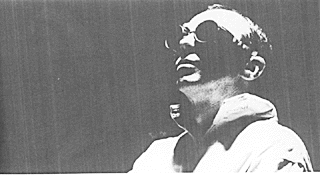 Schizopolis |
SHOOTING LILY
Dir/Scr: Arthur Borman; Prod: David Baxter, Richard Raddon; Exec Prod: Lon Bender, Wylie Stateman; DP: Mark Parry; Ed: Danny Canovas; with Matt Winston, Amy Smallman.
35mm, 82 min., 1996 (WP)
Having laughed my head off watching Borman's first feature, ...And God Spoke, I was happy to see the writer-director capture that same offbeat sense of humor in Shooting Lily, if on a much smaller and more personal scale. A cautionary tale for our media-(hyper)literate culture, Shooting Lily recounts the relationship between professional videographer David (Matt Winston) and his wife Lily (Amy Smallman), who walks out on their marriage during their annual New Year's Eve party. For David, Lily's leaving comes as a great shock and an even more powerful wake-up call. Angrily advising him to "Watch the tapes!" when David pleads ignorance about their marital problems, Lily seeks refuge at her parents' house, fairly certain of the dissolution of their relationship. Winston and Smallman are completely believable as a loving couple in a serious relationship crisis. Additionally, Winston's performance redefines what it means to be obsessive-compulsive. Shooting Lily proves to be an entertaining and often touching journey through David's manic, post-New Year's/pre-divorce trauma, a journey which gives new meaning to the old adage: "The unexamined life is not worth living."
-- Alison Macor
SHORTS PROGRAM 4
The Shorts Program 4 gets off to a rousing start with "Andre the Giant Has a Posse," a humorous and fascinating exploration of the semiotic power of stickers and our culture's drive for meaning. With intelligence and a genuine interest in her subject and respect for her audience, director Helen Stickler traces the development of the Andre the Giant sticker phenomenon, an "underground movement" (according to one lay semiotician) whose phenom power spawned the ultimate seal of approval -- copy-cat stickers. In sharp class-conscious contrast to this subcultural portrait is Katherine Belsey and Joshua Brown's "Fairytale in the Supermarket," a finely executed musical of capitalism and anarchy at the Orgo, an international food co-operative that may make viewers think twice the next time they buy canned goods. Continuing in the humorous vein established by the program's first two shorts, "Seven Virtues" utilizes a sharper edge as it visually illustrates the seven coveted virtues: patience, honesty, courage, compassion, self-discipline, loyalty, and faith. Turning these traits on their proverbial sides, director Myke Zykoff shows the audience that, with a little creativity, anyone can achieve total virtuosity. And speaking of virtuous, director Banks Tarver's ambitious documentary, "Watch Me Jumpstart," about the indie band Guided by Voices, suggests that following the seven virtues may just be the secret to achieving success and recognition in the fickle music scene. Certainly this band's self-discipline and patience led them out of Dayton, Ohio and onto the buzz list on MTV News. Interviews with band members such as Robert Pollard and Kevin Fennell show the behind-the-scenes journey that only a love affair with music could have inspired. Sound plays a key creative role as well in the fifth short in the program, Katie Cokinos' "3 Bites of the Orange," a moody series of three vignettes. The stylized, stunning imagery (beautifully photographed by Heyd Fontenot, Brian O'Kelley, and Mark Miks) coupled with the seductive soundtrack creates a hypnotic visual experience. Jolting the audience out of this lull is the final short in the program, director Todd Cobb's tongue-in-cheek tale of the perils of nicotine addiction. "Smokers" begins with the sweet voice of a young girl providing a litany of reasons for hating smokers, and then the film follows its unfortunately addicted protagonist as he spirals down into nicotine hell. A narrative in the tradition of those fine exploitation films from the 1950s, Smokers provides the final puff of humor that finished off the Shorts Program 4. "Planet Trash" by Kevin McKinney is also on the program but a print problem prevented its inclusion at this particular screening. -- Alison Macor
SWEETHEARTS
Dir/Scr: Aleks Horvat; Prod: Aleks Horvat, Janeane Garofalo; Exec Prod: Buckley Norris, Lawrence Sheman, Tom Taylor; DP: John Peters; Ed: Terry Kelley; with Janeane Garofalo, Mitch Rouse, Margaret Cho, Bobcat Goldthwaite.
35mm, 85 min., 1996 (RP)
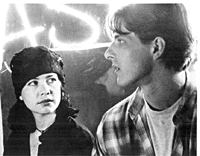 Sweethearts |






